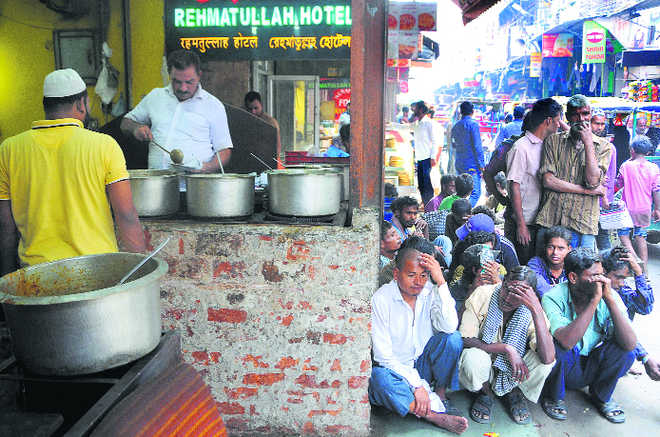
Aiding the have-nots: Poor labourers sit outside a restaurant in Chandni Chowk, Old Delhi, waiting for food. Zakat or charity is one of the five tenets of Islam Photo: Mukesh Aggarwal
Sandeep Dikshit
It is risky to expound on Islam at a time when the ruling arrangement is consciously engaged in politically marginalising the Muslim community. Sanjiv Bhatla, after lukewarm turns at poetry and fiction writing, is not just made of sterner stuff but seems to have imbibed his Islam well. Only a person who takes a deep draught of any philosophy — from Marxism to Zoroastrian — can feel confident of appreciating its original message. And only a person convinced about the message from that philosophy ventures to explore its larger implications and limitations. Bhatla attempts both which explains his clarity about Islam and the need for its adherents to follow its holy book, the Koran.
Indians are no strangers to different strands of religions that have made the region their home and adapted to its customs and traditions. They also know there is no monolithic religion despite near-continuous attempts by zealots of various faiths to mould the rest in line with their personnel vision of a particular religion. A philosophy takes a generation of scholarship to grasp. The task is beyond this book and its author. There is a wealth of brilliant reads on Islam in, perhaps, every language. Instead, this one excels at busting many myths and misconceptions.
As Bhatla begins to trace the beginnings of Islam, it becomes clear how a near-pristine faith developed its many offshoots. It is the frailty of the leaders who followed Muhammad and the four “rightly guided” caliphs and their desire to shun consultative arrangements to elect the fifth caliph that brought about a schism today known as the Shia-Sunni divide.
The early Muslims did not harbour any ill will towards the Jews even though the killing of 800 Jews of Banu Qurayza tribe has been highlighted. When put in the proper historical setting, it emerges that the Jewish tribe in question had betrayed a then-struggling Mohammad, not once but three times. A large part of Muhammad’s struggle to establish Islam, in fact, was studded by several instances where he forswore bloodshed or vengeance.
The story about the beginning of Islam unfolds with its many coloured views. It is exciting and exhausting. Each turn of events contains a lesson. Many incidents can only be understood in their specific geographical and historical perspective, set almost 700 years ago in a society that was primitive and unlettered. And it was this savage society that Muhammad set out to reform with great success. This successful retelling of those events will be useful for anyone wanting to set out in the world with an unjaundiced view of its fellow adherents of Islam: from the actual chronology of Muhammad’s many marriages and why it was so; or why did the poor in most parts of the world gravitate to Islam, just as they had turned to Christianity some 600 years earlier.
The retelling of The Koran should have formally ended with the passing away of Mohammad and his four rightly guided caliphs. But the book soldiers on to cast an eye on Islam after Mohammed, especially the rapid spread of the religion, some of it stained by the blood of the capitulated on the swords; the aggression brought upon not because of the Book but driven by an equal mix of avarice and zealotry of the rulers.
Stereotypes fall by the wayside, such as the one on burkha. It was not an original injunction but the later work of the same “suspicious male mind that invented the chastity belt (in Christianity)” or the one that Islam has always treated its women badly. Not so: (i) Meher or dowry to the bride stemmed female infanticide; (ii) Inheritance rights to women; (iii) Allowing them easy divorce; and, (iv) Sweeping rights to widows. What about the men who are allowed to marry four times? Muhammad may have made this provision considering the fact that he had already angered the male elders by his revolutionary freedom to women. Also most of the multiple marriages in Mohammad’s inner circle were to provide social support to widows of heroes who had fallen in battle. This upper limit also put an end to footloose kind of polygamy.
As with the treatment of women or dealings with non-Muslims, distortions took place in countries ruled by authoritarians, not because of any infirmities in the philosophy but because the rulers adopted short cuts to stay in power by misinterpreting and misquoting the religion’s original intentions.
This book should be a stepping stone to correcting many of the popular distortions about Islam.



























